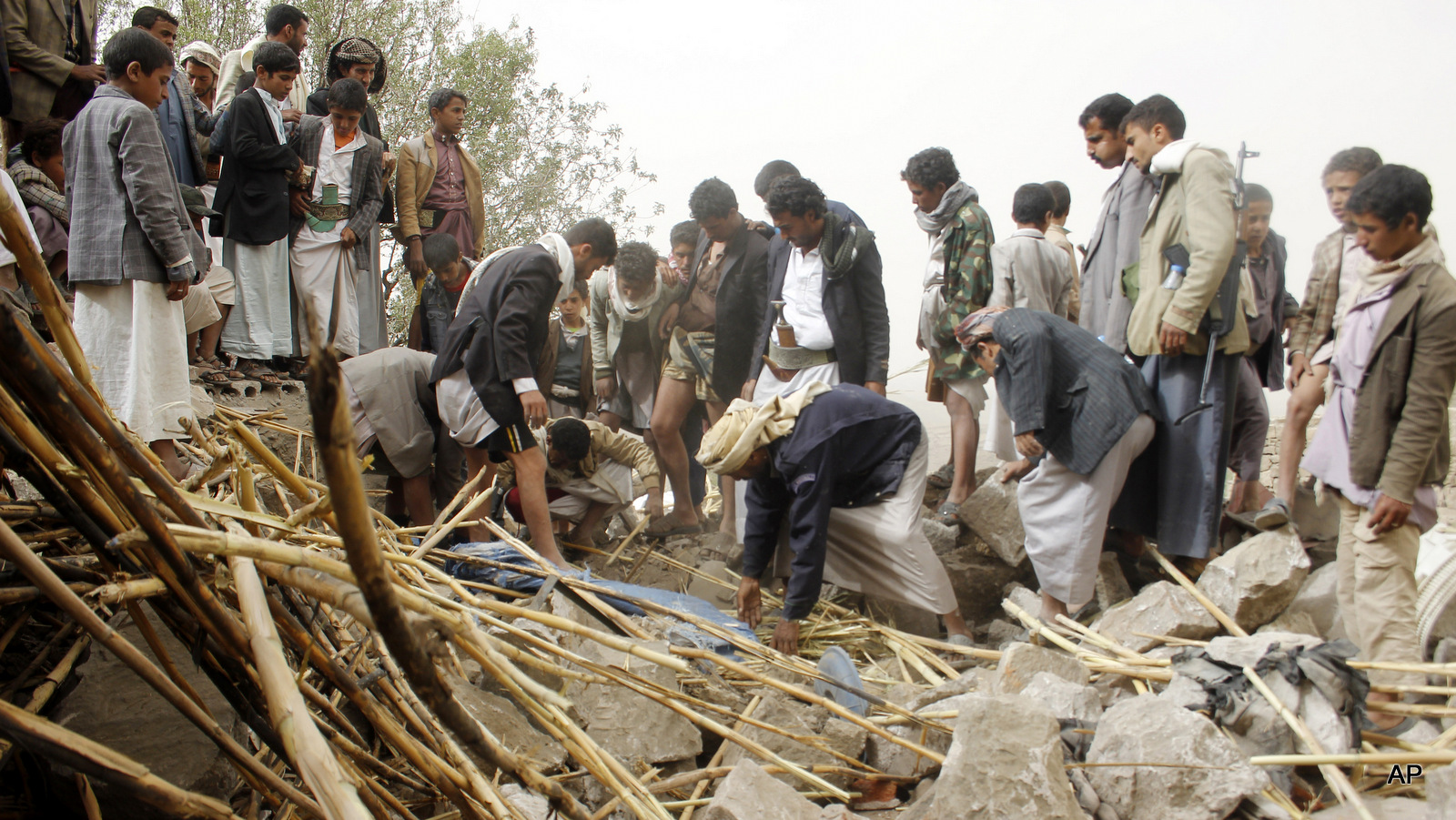 Yemenis search for survivors in the rubble of houses destroyed by Saudi-led airstrikes in a village near Sanaa, Yemen, Saturday, April 4, 2015.
Yemenis search for survivors in the rubble of houses destroyed by Saudi-led airstrikes in a village near Sanaa, Yemen, Saturday, April 4, 2015.
LONDON — Since the Arab Spring lit up the streets of Yemen in 2011, the impoverished country on the tip of the Arabian Peninsula has crumbled under the weight of political instability, insecurity, abject poverty and the threat posed by radicalism.
Once hailed by the Obama administration as a positive model for the region, Yemen is now straining under a torrent of bombings being carried out by a Saudi-led coalition with broad backing from countries throughout the Arab world and even the United States.
The Saudi-led campaign is reportedly aimed at restoring Yemen’s “rightful” government by defeating the Iran-backed Houthi movement.
MintPress News is watching the situation closely and providing updates from a number of sources, including eyewitnesses, government officials and Houthi leaders.
March 25, 2015
At 7:00 p.m. EDT, Saudi Arabia and a coalition of Arab powers launch a large-scale air attack on Yemen. Egypt, Bahrain, the United Arab Emirates, Kuwait, Qatar, Morocco and Jordan confirm that they are backing Saudi Arabia’s campaign against the Houthis, a group which took control of the Yemeni capital Sanaa about six months ago.
The Associated Press reports: “In an unusual tableau, Saudi Arabia’s ambassador to the United States announced the rare military operation by his country at a Washington news conference about a half-hour after the bombing began.”
Ambassador Adel AL-Jubeir justifies Riyadh’s decision by telling the press that Saudi airstrikes are designed “to prevent Yemen from falling into the hands of the Houthis.”
It is unacceptable, Al-Jubeir says, for a “militia,” as he called the Houthis, to have air power, along with “ballistic missiles, heavy weapons as well as military bases and ports.”
As the Houthi leadership slams the kingdom for unilaterally declaring war on Yemen without so much as a legal mandate — neither from the U.N. Security Council nor the Arab League — Abdel-Malik al-Houthi labels the military intervention an illegal and illegitimate act of war against the people of Yemen.
Ali al-Amad, a Houthi leader and spokesman, tells MintPress News that Saudi warplanes are targeting Yemen’s military interests in northern Yemen. “Al Dulaimi base in Sanaa was hit by warplanes. We responded by firing our anti-aircraft guns,” he said.
“We will match whatever aggression Saudi Arabia launches at us with equal measure,” al-Amad warned.
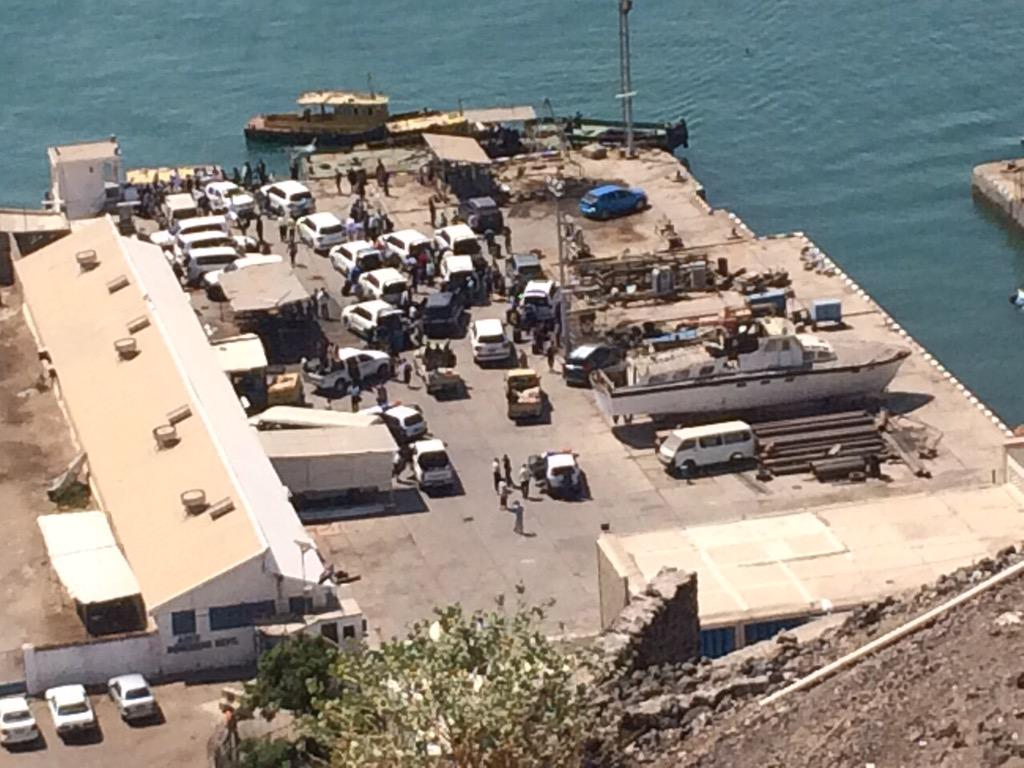 Aden, March 25, 2015. (Image: Hakim Al Masmari)
Aden, March 25, 2015. (Image: Hakim Al Masmari)
Abed Rabbo Mansour Hadi, Yemen’s former president, who resigned in January, leaves the seaport city of Aden for an undisclosed location as Houthi fighters seize control of the city’s international airport.
Dr. Abdel-Alem Kulaib in Aden tells MintPress that several small Houthi units entered several districts of Aden ahead of a broader military deployment. “We heard sporadic gunfire and faraway explosions,” he said. “People are leaving the city over fears of heavy fighting in the coming hours.”
March 26, 2015
Residents in Sanaa awake to destruction. Despite the overnight air raids, Yasmin Kulaib in Hadda, a neighborhood in south Sanaa, tells MintPress that life is “somewhat normal.”
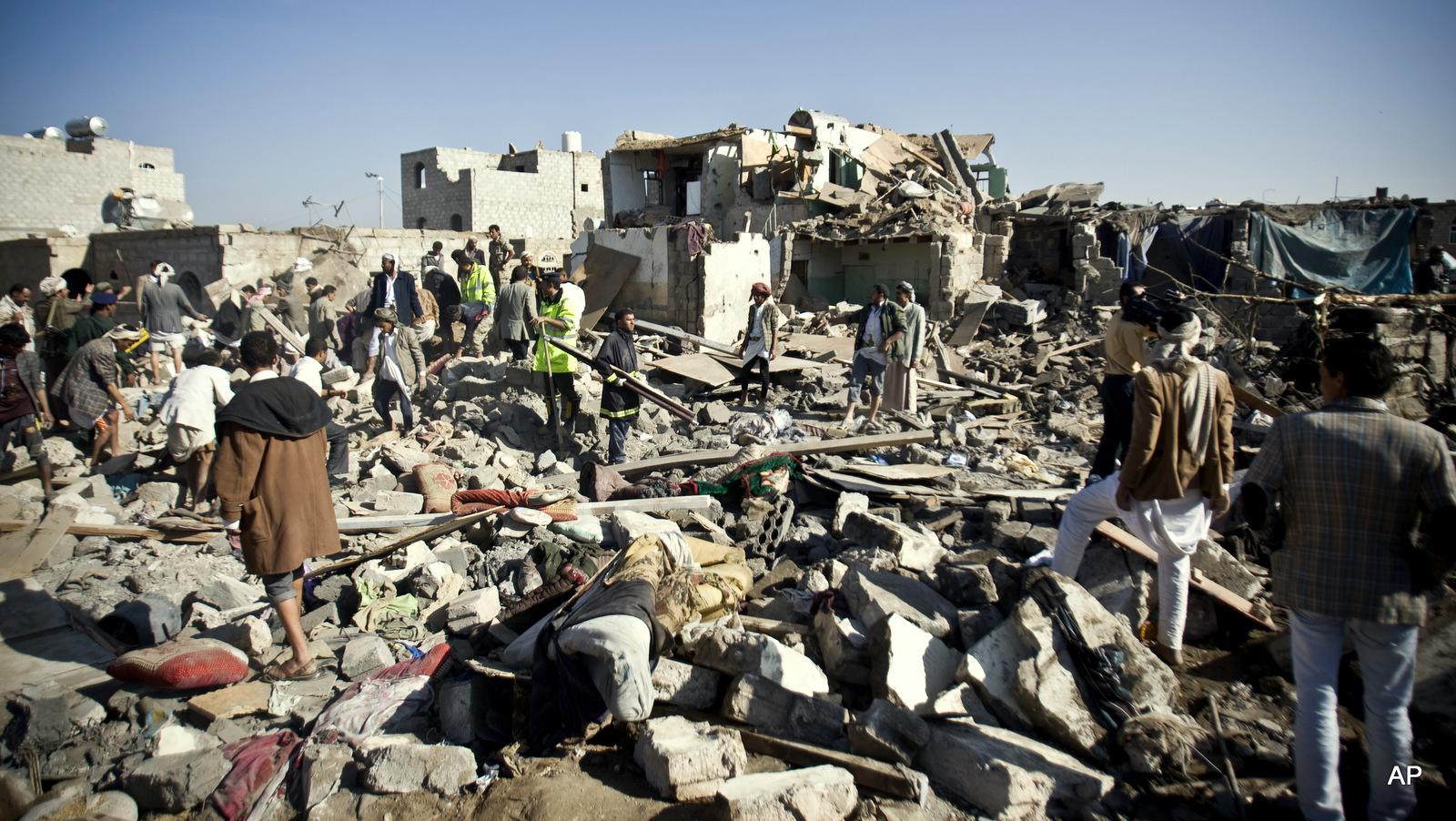 People search for survivors under the rubble of houses destroyed by Saudi airstrikes near Sanaa Airport, Yemen, Thursday, March 26, 2015.
People search for survivors under the rubble of houses destroyed by Saudi airstrikes near Sanaa Airport, Yemen, Thursday, March 26, 2015.
“Most people went to stock up on food and water. This is not our first rodeo,” Kulaib said. “Sadly, we know exactly what war means for us. The streets are quiet this morning, but people are still out and about. The shops are open.”
Demonstrators in Sanaa take to the streets to denounce the airstrikes. Tens of thousands of men and women express their anger and condemnation of Saudi Arabia’s actions against Yemen.
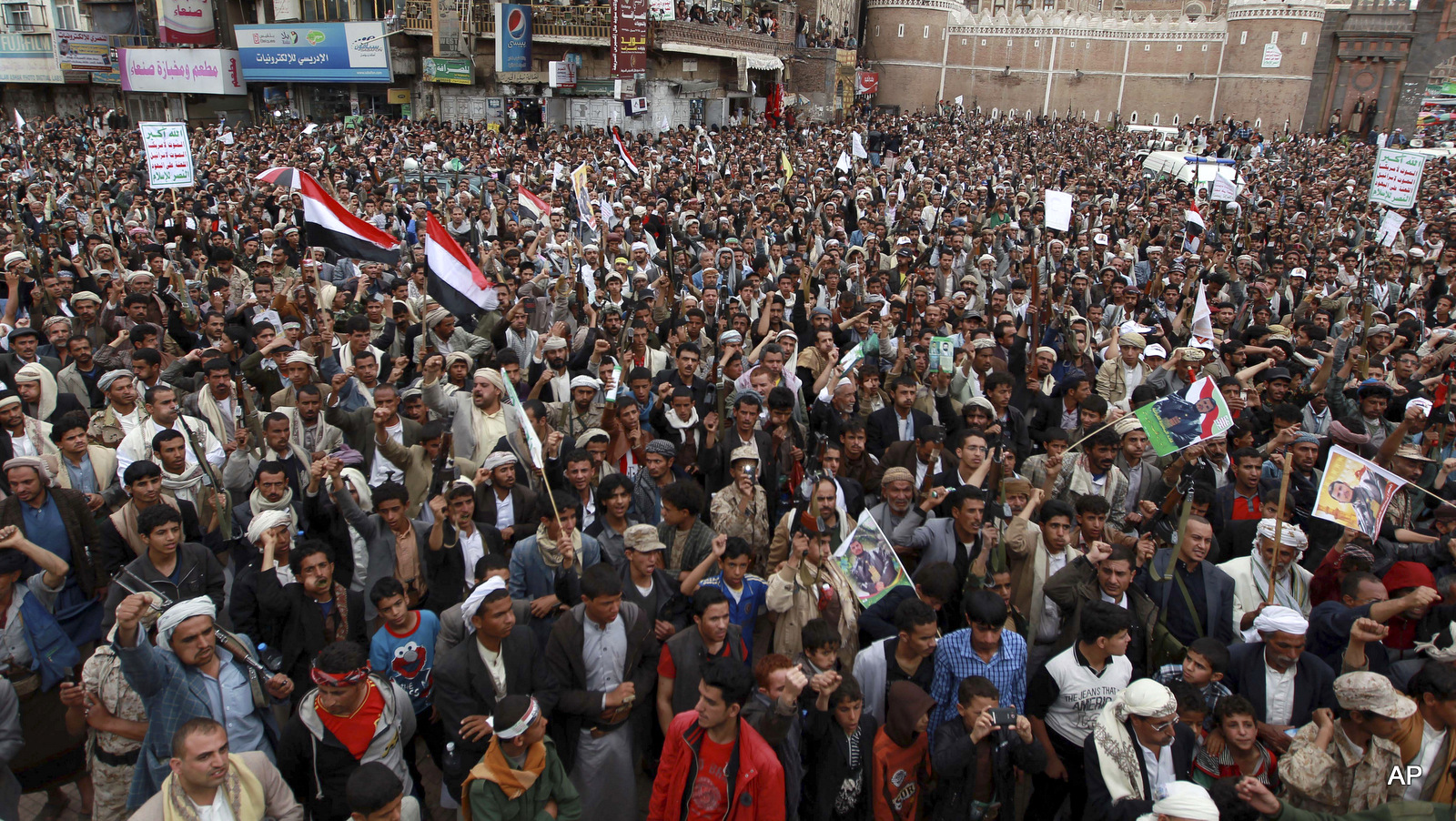 Yemenis gather to protest against Saudi-led airstrikes, during a rally in Sanaa, Yemen, Thursday, March 26, 2015.
Yemenis gather to protest against Saudi-led airstrikes, during a rally in Sanaa, Yemen, Thursday, March 26, 2015.
Meanwhile, the first civilian casualties start arriving at hospitals.
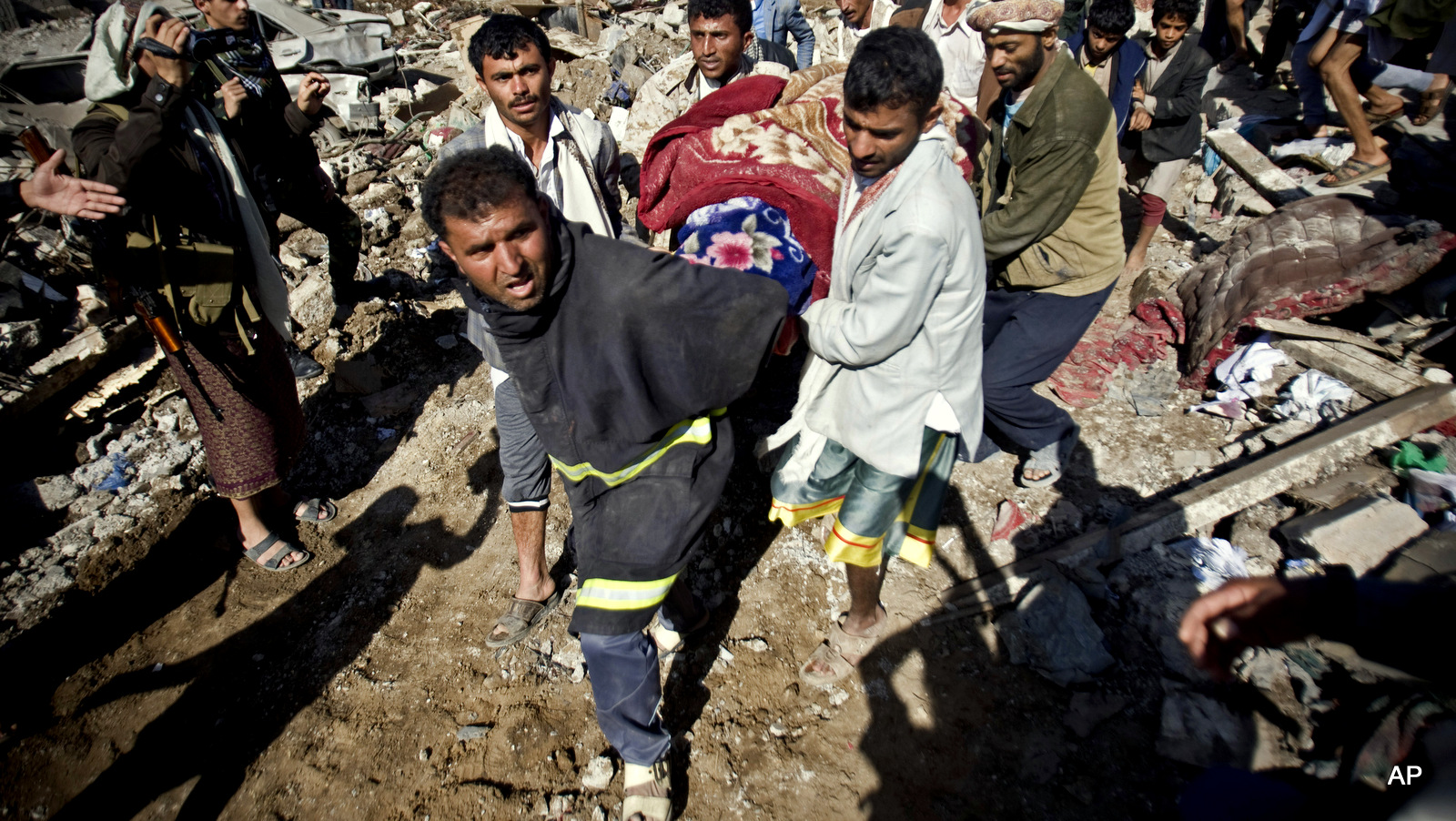 People carry the body of a woman covered with a blanket from under the rubble of houses destroyed by Saudi airstrikes near Sanaa Airport, Yemen, March 26, 2015.
People carry the body of a woman covered with a blanket from under the rubble of houses destroyed by Saudi airstrikes near Sanaa Airport, Yemen, March 26, 2015.
In Aden, the former southern capital of South Yemen, fighting intensifies as Houthi armed militants backed by the 33rd Brigades and other units under the once-dissolved Republican Guards, now under the control of former President Ali Abdullah Saleh, push against Hadi loyalists.
Intense fighting is reported at the Aden airport as factions vie for power.
Street fights break out as civilians take up arms in support of the political faction with which they are aligned.
Ahmed al-Shami, a member of the Houthis’ political bureau, tells MintPress that the Houthi leadership is determined to prevent Aden from falling to the Saudi-led coalition, which would cost the Houthis critical access to the sea.
“Where is the international community now?” al-Shami asked. “Where are Western leaders’ condemnations over a clear violation of Yemen’s territorial sovereignty?”
Bodies begin to pile up at local clinics and hospitals as violence continues to escalate. Dr. Abdel-Mageed al-Sharjabi in Aden warns that supplies could soon run low unless aid is provided to medical workers.
“We are already stretched as it is. I doubt we will be able to meet people’s needs if fighting goes on for much longer. Most hospitals rely on diesel-fuelled generators to provide electricity and if this runs out then we are facing a terrible crisis,” al-Sharjabi told MintPress.
Abdel-Malik al-Houthi delivers an impassioned televised speech, calling Saudi Arabia a criminal regime and accusing the Saudi-led coalition of carrying out an “unjustified” attack on his Iran-backed forces.
Egypt announces that it is prepared to send troops if Saudi Arabia calls for a ground offensive against the Houthis in Yemen.
“Egypt has declared its political and military support,” Egyptian foreign minister Sameh Shoukry says at a meeting of foreign ministers in Sharm el-Sheikh, Egypt, ahead of the Arab League summit, “as well as its participation with the coalition with an aerial and naval Egyptian force, as well as a ground force if necessary, in light of Egypt’s historic and unshakeable responsibility towards Arab and Gulf national security.”
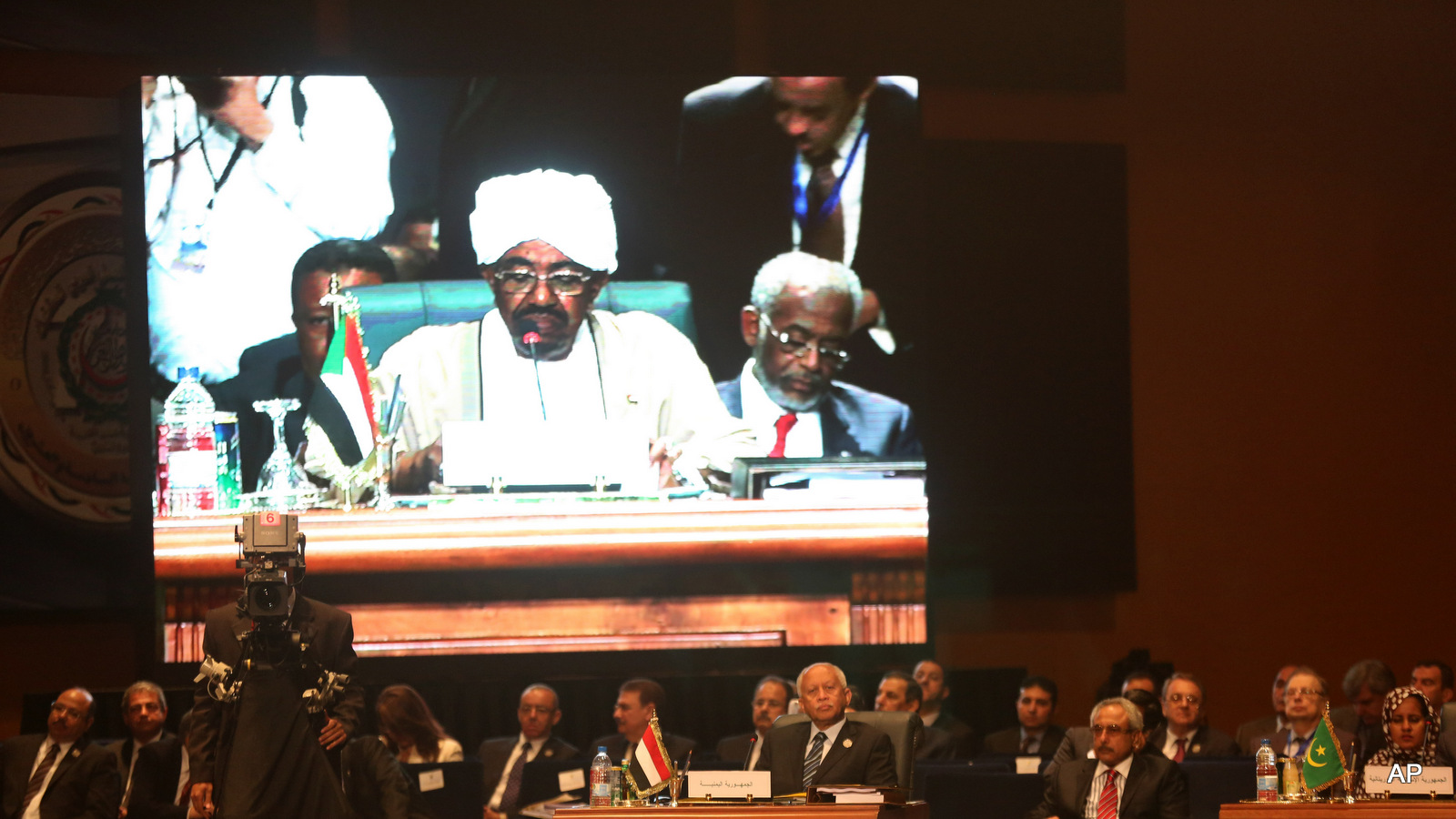 Sudanese President Omar al-Bashir declares support for the Saudi let attack on Yemen in Sharm el Sheik, South Sinai, Egypt, Saturday, March 28, 2015.
Sudanese President Omar al-Bashir declares support for the Saudi let attack on Yemen in Sharm el Sheik, South Sinai, Egypt, Saturday, March 28, 2015.
Sudan also confirms that it is entering the Saudi-led coalition against the Houthis in Yemen. Sudan’s participation is potentially problematic for the U.S., which is backing the Saudi-led coalition and includes Sudan on the State Department’s list of State Sponsors of Terrorism.
March 27, 2015
The first images of the destruction in Sanaa come through, showing that the outskirts of the capital have been hit particularly hard.
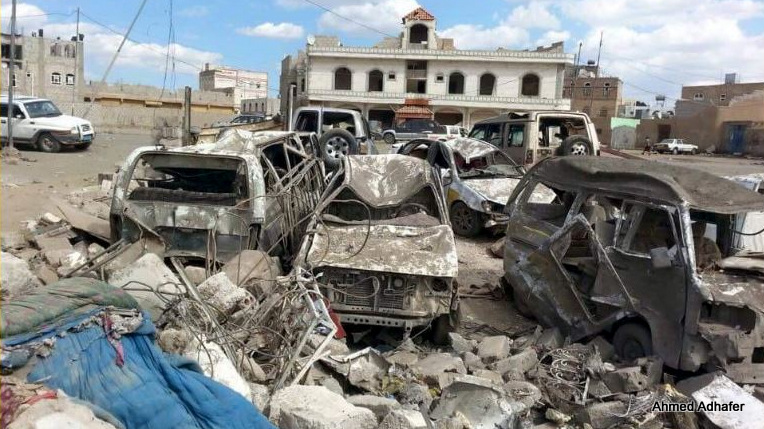 The northern outskirts of Sana’a, March 27, 2015.
The northern outskirts of Sana’a, March 27, 2015.
White House spokesman Josh Earnest says the U.S. counterterrorism strategy in Yemen cannot be assessed against Sanaa’s failure to achieve political stability.
“The strategy that the [Obama] administration has pursued in Yemen is not a nation-building strategy, it’s a counterterrorism strategy,” Earnest said at a daily press briefing. “[I]f you evaluate that strategy over the last several years, you will see that because of the strategy that we have pursued we have succeeded.”
The Houthi leadership confirms that the Saudi-led coalition has targeted the northern province of Saada, the militant group’s main stronghold.
The Houthis announce that they have released Yemen’s former defense minister. Sputnik reports: “Yemen’s former defense minister Mahmoud Subaihi and Brigadier Faisal Rajab of the 119th brigade were released by an order of the Houthis leader Abdul-Malik.”
March 28, 2015
Hodaida airport on fire following Saudi strike
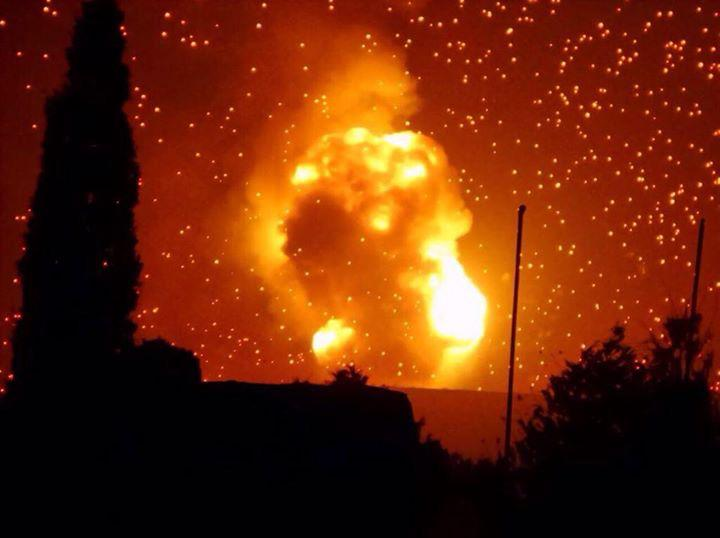
Houses in Sanaa fall under Saudi bombing
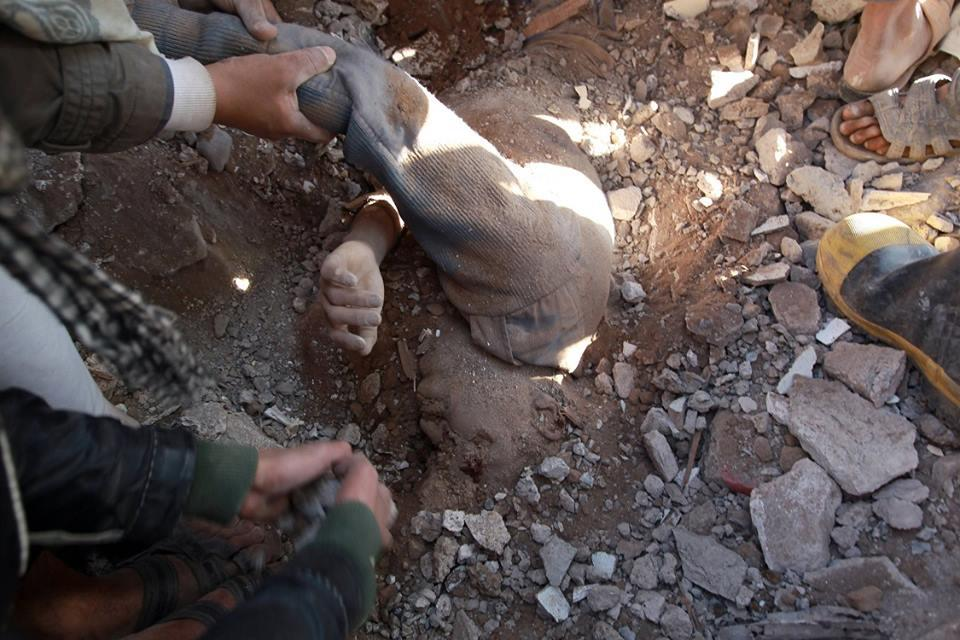 Houses in Sanaa fall under Saudi bombing. (Hakim Al Masmari), March 28, 2015 – Sana’a
Houses in Sanaa fall under Saudi bombing. (Hakim Al Masmari), March 28, 2015 – Sana’a
Staff in hospitals throughout Sanaa are reportedly overwhelmed by the number of casualties arriving. Sana’a hospital March 28, 2015. (Photo: Hakim Al Masmari)
The Houthis deploy fighters across the capital and its outskirts in a desperate attempt to protect the city.
The Houthis claim to have downed a Saudi plane in al-Hatarish, a district near Sanaa. Saudi officials refuse to comment.
As talk of a potential ground invasion involving Egypt and Pakistan intensifies, Yemenis across the political spectrum begin to rally behind the Houthi leadership. Effigies of Hadi, the former president, who resigned in January, are burned in the capital and several towns across northern Yemen.
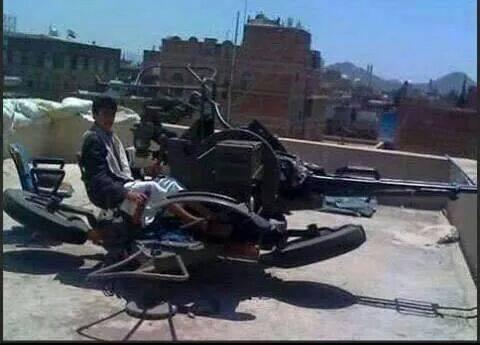
Houthi fighters move more artillery and men north, in view of opposing Saudi Arabia at its southern borders. Mohammed al-Bukhaiti, a spokesman for the Houthis, who moves between Sanaa and Saada, tells MintPress that more fighters will be dispatched to the Saudi border.
The United Nations evacuates staff from Sanaa, and 86 Arab and Western diplomats are evacuated from the seaport city of Aden by the Saudi navy.
Russian President Vladimir Putin calls on the international community to end the violence.
“We support Arab nations in their effort to ensure a safe future and urge them to resolve all emerging challenges peacefully without any foreign involvement,” Putin said in his message to Arab League nations attending a summit in Sharm al-Sheikh, Egypt.
U.N. Secretary-General Ban Ki-moon echoes Putin, saying, “It is my fervent hope that at this Arab League Summit, leaders will lay down clear guidelines to peacefully resolve the crisis in Yemen.”
March 29, 2015
Scenes of destruction at Hodaida airport
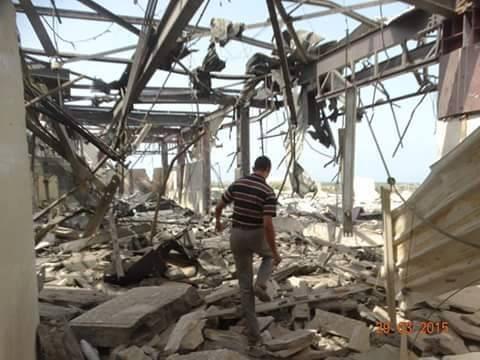 Hodeida airport – March 29, 2015. (Photo: Hakim Al Masmari)
Hodeida airport – March 29, 2015. (Photo: Hakim Al Masmari)
As Yemenis wake up to more devastation and misery, Yemen’s exiled foreign minister, Riyad Yassin, confirms that Hadi will stay in one of the Arab capitals until conditions in Yemen allow him to return.
“The president [Hadi] has no plans to return to the south [Yemen] until it is possible [to do so],” Yassin said, as quoted by Bahraini news outlet Al-Wasat, an Arabic daily based in Bahrain.
Sanaa International Airport is under heavy fire. Civilians living near the airport describe scenes of complete and utter destruction. Fatma Saleh, whose home is less than a mile from the airport, says dozens of warplanes came from all directions to strike the airport.
“The sky was black with planes. We fled in the fields to escape … There is nowhere to run anymore. The children most of all are living in fear of the planes … The sound they make is terrifying,” Saleh told MintPress.
Yassin stresses the importance of an immediate launch of a ground operation in Yemen, stating that it can be started within few days.
Chinese warships arrive in Aden to begin the process of evacuating Chinese diplomats and nationals.
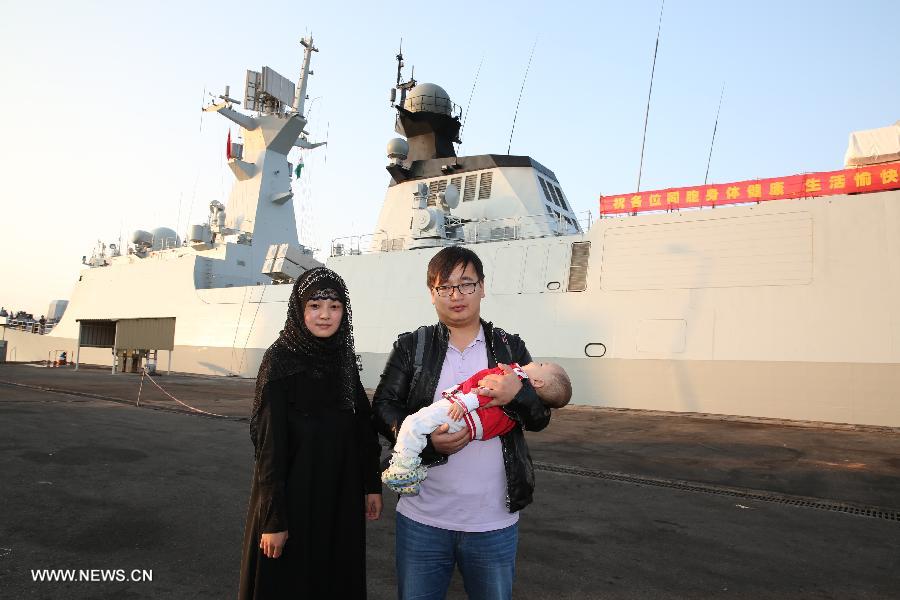 Ma Zhiqiang(R) pose with his family members in front of the missile frigate after they arrived in Djibouti, March 31, 2015. More than 500 Chinese evacuees from conflict-ridden Yemen have arrived at the Djibouti port as the situation continues to deteriorate in Yemen. (Xinhua/Pan Siwei)
Ma Zhiqiang(R) pose with his family members in front of the missile frigate after they arrived in Djibouti, March 31, 2015. More than 500 Chinese evacuees from conflict-ridden Yemen have arrived at the Djibouti port as the situation continues to deteriorate in Yemen. (Xinhua/Pan Siwei)
March 30, 2015
The International Criminal Court announces that it will investigate the Saudi-led attacks on Yemen in response to a complaint filed by Yemen’s legal team.
Officials in Sanaa confirm that a refugee camp in northern Yemen was hit by a Saudi warplane. “45 people were killed and another 65 injured in an airstrike by a Saudi-led coalition at a refugee camp in Houthi-controlled northern Yemen on Monday,” RT reports, citing a report from the International Organization for Migration.
A statement from Yemen’s defense ministry read:
“Saudi warplanes targeted one of four refugee camps in the Harad district, which led to the death and injury of several of its residents. The airstrike targeted camp 1 in the Mazraq region, which houses around 4,000 refugees, leaving over 40 people dead – including women and children – and over 250 others injured.”
Speaking on developments in Yemen and the mounting civilian casualties, Joe Stork, deputy director for Human Rights Watch’s Middle East and North Africa Division, told RT: “It’s really hard to see what good can possibly come out of this campaign. I think, frankly, this is a political question, not a human rights question, but it’s really difficult to see how the government of Hadi could possibly be restored under this circumstances.”
Clashes between pro-Houthi civilian fighters and pro-Hadi forces backed by the Saudi coalition intensifies yet again in Aden as Houthis resort to shelling the city.
Civilians are seen fleeing several districts as mortar shells hit buildings and military positions.
As night falls airstrikes intensify over Sanaa
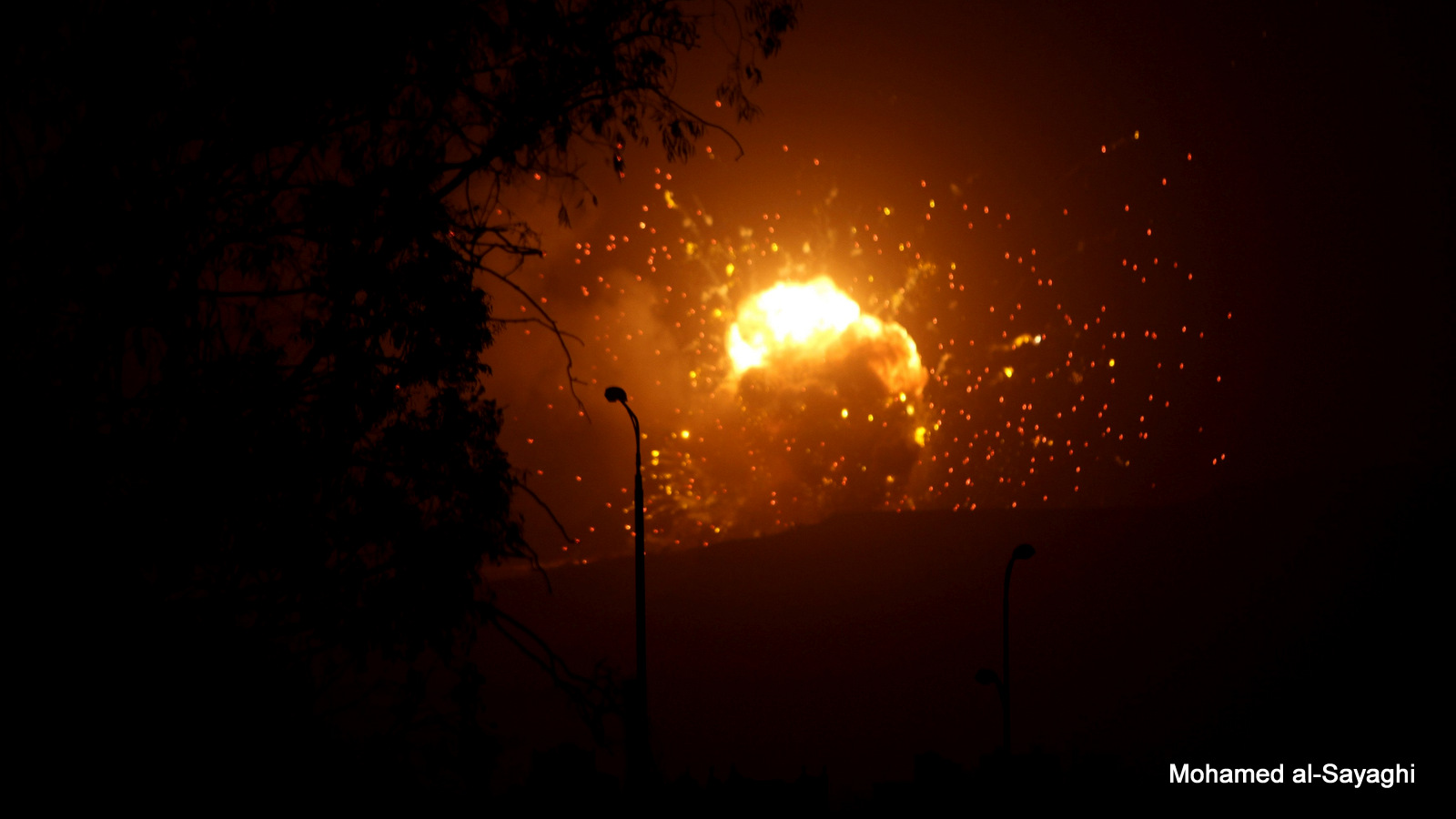 Fire is seen at a military site after it was hit by an air strike on the Faj Attan mountain of Sanaa March 30, 2015.
Fire is seen at a military site after it was hit by an air strike on the Faj Attan mountain of Sanaa March 30, 2015.
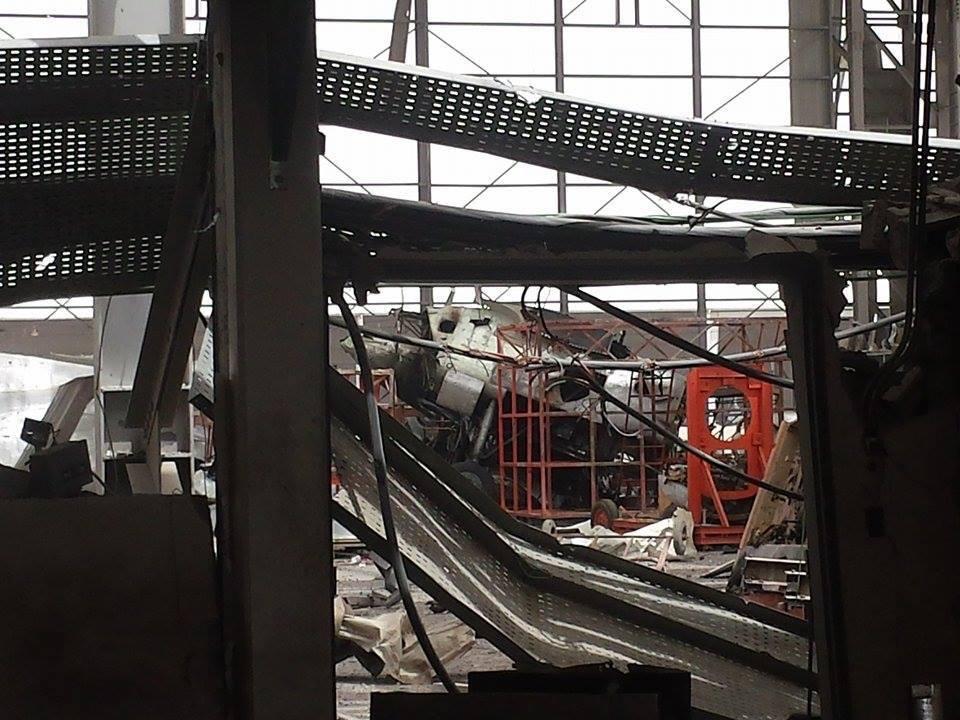
Destruction at Sanaa International Airport, March 30, 2015. (Photo: Mohammed Al Bukhaiti)
March 31, 2015
Yemenis are stranded in Egypt with no means of returning home. Dozens have decided to camp in front of Yemen’s embassy in Cairo, to express their anger and frustration.
Yemenis across the world remain stuck in transit, cut off from their families and unable to reach home.
Speaking to MintPress, Baraa Shiban and Sara Jamal, both human rights activists in Yemen, denounce what they describe as “world powers’ conspiracy against Yemen and the Yemeni people.”
Mona Alwakeel, a Yemeni national stranded in Lebanon, told MintPress, “I was meant to go back to Yemen days ago, but now because of the no-fly zone I cannot. There are dozens, maybe hundreds of people like me. Not only our country is being attacked by foreign powers, now we cannot even go home. We are a people without a country.”
Aden breaks under a barrage of mortar shells and heavy gunfire as pro-Houthi civilian fighters and Houthi fighters dig their heels into the city, slowly securing some advances against Hadi forces, confirmed civilians.
Houthi militias backed by the 17th Armored Division enter a military base overlooking Bab al-Mandeb, on the Red Sea coast, in the Dabab district of the southern province of Taiz.
Saudi-led coalition warplanes immediately bomb the area.
Salem al-Hamadi, a retired general in the 3rd Brigade in Sanaa, tells MintPress that several tribal leaders in Hadramawt, Ibb and Dhamar have already defected from Hadi in favor of the Houthis as fear mount that foreign troops could be deployed on the ground.
“Yemenis consider any intervention on their land an absolute affront. Comments made by Hadi calling for more bombings when civilians are dying has enraged many tribesmen,” al-Hamadi said. “If troops come, regardless of our differences we will fight alongside the Houthis.”
Humanitarian groups call on the international community to allow aid into Yemen.
“There are casualties across the country. There have been air strikes in the north, west and south, and clashes between opposing Yemeni armed groups in the center and south, that are putting immense strain on already weak medical services,” said Cedric Schweizer, the leader of an International Committee of the Red Cross (ICRC) team of 300 people in Yemen.
April 1, 2015
Overnight airstrikes destroy a milk and yogurt factory in the southern Yemeni province of Lahj. Local officials put the number of dead at 29, but doctors warn that the death toll could rise throughout the day as workers might succumb to their injuries.
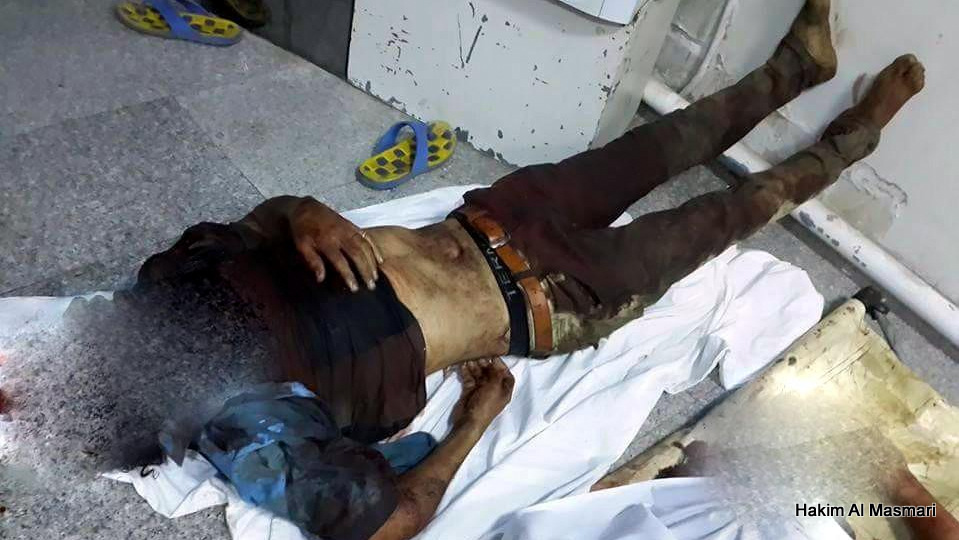 Deceased factory workers following a Saudi airstrike on on a yogurt factory. (image blurred)
Deceased factory workers following a Saudi airstrike on on a yogurt factory. (image blurred)
Yemenis overwhelmingly condemn the overnight attack, slamming Saudi Arabia for war crimes as warplanes continue to strike civilian targets across the country.
Saudi Arabia denies conducting the strike, saying the Houthis are to blame.
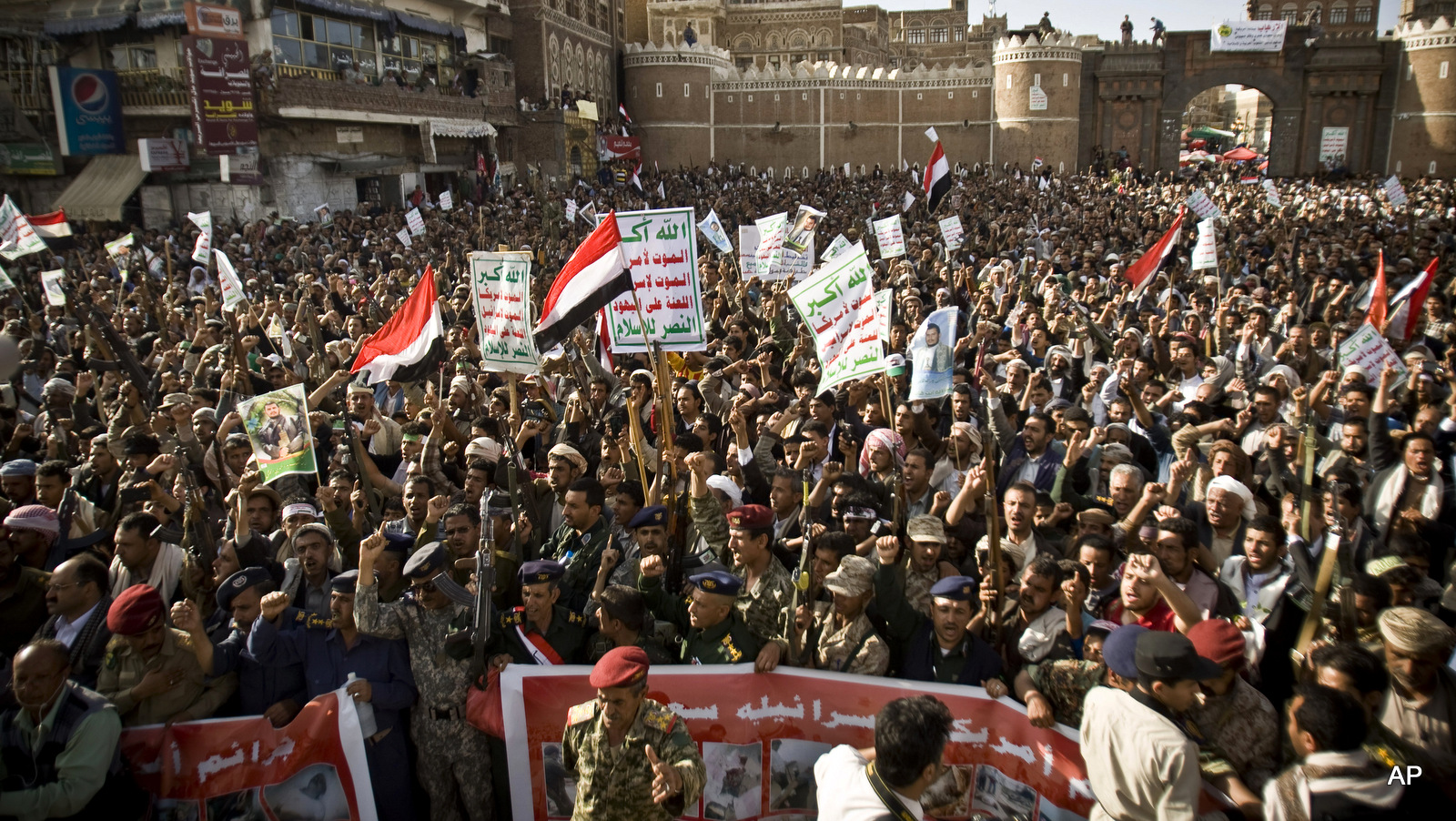 Houthis protest against Saudi-led airstrikes, during a rally in Sanaa, Yemen, Wednesday, April 1, 2015.
Houthis protest against Saudi-led airstrikes, during a rally in Sanaa, Yemen, Wednesday, April 1, 2015.
Thousands of armed, pro-Houthi protesters take to the streets of Sanaa to call on Abdel-Malik al-Houthi to authorize a direct ground attack against Saudi Arabia.
Medical officials in Aden confirm that 26 people were killed in intense overnight fighting in Khor Maksar, a popular district of the seaport city.
Reuters reports: “Iran-allied Houthi militiamen along with allied army units are pushing on the outskirts of the city, the last bastion of Yemeni President Abdo Rabbo Mansour Hadi, despite six days of Saudi-led air strikes meant to stem their advance.”
Mohammed al-Bukhaiti, the Houthi spokesman, tells MintPress that he expects Aden to fall to the Houthis within hours.
“Saudi Arabia might have war technology on its side, but we have men on the ground trained in street warfare. What we don’t have in heavy weapons we make up for in determination. Our push towards Aden is strategic, we need to create a humanitarian corridor to offer Yemenis aid relief, and since the Kingdom is running a blockade against Yemen, we need to puncture through,” al-Bukhaiti explained.
U.N. Yemen Humanitarian Coordinator Johannes Van Der Klaauw issues the following statement on Yemen:
“Amman, 1 April 2015.
I am appalled to learn of the killing of a volunteer with the Yemen Red Crescent Society (YRCS) in Al Dhale’e in southern Yemen, on Monday, 30 March 2015. This incident has been confirmed by the Ministry of Health and humanitarian partners working in the health sector. Humanitarian workers are putting their lives at risk every day in Yemen to provide critical, life-saving assistance to millions of Yemenis. Their courage and dedication are unsurpassed.
I am appealing to all parties to the conflict to ensure freedom of movement and access for humanitarian workers to carry out their work in safety, as well as unfettered access to those in need. This includes allowing the free and safe movement of humanitarian aid supplies into and within Yemen. Our work in the humanitarian community depends on our ability to bring staff and supplies into the country without restrictions.
I am also deeply concerned by reports of mounting civilian casualties and continued destruction and damage to civilian infrastructure. All parties to conflict in Yemen must observe their obligations under international humanitarian law to protect civilians and the means to provide them with health care, water and sanitation, access to food and livelihoods and other vital services.
I reiterate my call to the parties to find a negotiated solution to the conflict in Yemen, as failure to do so will put the entire population in Yemen at risk.”
News emerges from Aden that the pro-Hadi Aden TV Channel had been shut down by the Houthis as they seize control of Aden.
Reuters confirms reports out of Aden that the Houthis have pushed back pro-Hadi forces.
April 2, 2015
#Yemen: Fires throughout #Aden. Complete chaos on the streets. pic.twitter.com/L5XiTkK15u
— RK (@_RK_88_) April 2, 2015
As the Houthis tighten their grip over the seaport city of Aden, Ali al-Amad, a Houthi leader, confirms that the militant group will likely be forced to engage Saudi Arabia on the ground and bring the fight to the kingdom.
Photos: #Aden has turned into a total war zone. Dangerous situation on the ground #Yemen pic.twitter.com/RuqJX73Llq
— Conflict News (@Conflicts) April 2, 2015
Another Houthi official, Fadel Mutag, tells Russia’s RIA Novosti, “Right now we control up to 90 percent of the Aden territory. Fights are taking place near one of the city’s churches.”
Amid mounting violence in Aden, al-Qaida stages a prison break in the country’s southeast. The Guardian reports: “Khalid Batarfi, a senior al-Qaida figure who had been held for more than four years, was among more than 300 prisoners who escaped from the jail in Hadramawt province, the official said on Thursday. Two prison guards and five inmates were killed in the clashes.”
Speaking on condition of anonymity, security officials tell MintPress that earlier today al-Qaida militants also targeted the central bank, police headquarters, checkpoints and a local government office in Mukalla.
“Al-Qaida is clearly using chaos to its advantage. Some in the province have argued that the Saudis are using Al Qaida to destabilize Yemen and open a new front for the Houthis to fight,” one security official said.
Although such allegations could not be independently verified, the Guardian confirmed through its own reporting that al-Qaida had carried out additional attacks in the province.
Conflicting reports emerge from Aden as pro-Hadi officials in the city claim foreign fighters have been deployed there from Egyptian and Saudi warships. In 1962, the last time the Saudis and Egyptians sent troops to fight in Yemen, tens of thousands of people were killed.
Eyewitnesses in Aden tell MintPress that “the foreign troops” were, in fact, Chinese soldiers trying to secure the evacuation of their nationals after their vessel came under Saudi fire.
Reuters reports: “A Yemeni official denied that ground troops had landed in Aden and a port official said they were armed guards who had disembarked from a Chinese ship trying to bring aid or evacuate civilians.”
Saudi officials insist their decision to military intervene in Yemen aims to restore “legitimate government in Yemen.”
Amb: We're committed to restoring the legitimate government in Yemen.
— Saudi Embassy (@SaudiEmbassyUSA) April 2, 2015
Sanaa-based rights activist and political analyst, Hisham Al Omeisy takes to Twitter, voicing his concerns over humanitarian situation in Aden.
Family in Aden #Yemen now: "No electricity, extremely hot/humid, no gas, no water, homes randomly shelled" Oh God! pic.twitter.com/9GWTEKrrlN
— Hisham Al-Omeisy (@omeisy) April 2, 2015
April 2, 2015
https://twitter.com/_RK_88_/status/583639739510759424/photo/1
Islah — a Sunni radical party that serves as an umbrella for the Muslim Brotherhood, Sunni tribal factions, and Salafi and Wahhabi militants — announces its official support of the Saudi-led military campaign in Yemen.
Islah Party officially announces its support for the use of #Saudi Airstrikes in #Yemen against Houthis. #اليمن pic.twitter.com/DPokRqfrff
— Yemen Post Newspaper (@YemenPostNews) April 2, 2015
At around 6 a.m. local time, large explosions are heard in Aden’s Crater district. Heavy gunfire erupts as pro-Hadi forces allied with Haraki elements — Southern Secessionists — and Islahis attempt to push back Houthis and pro-Saleh troops.
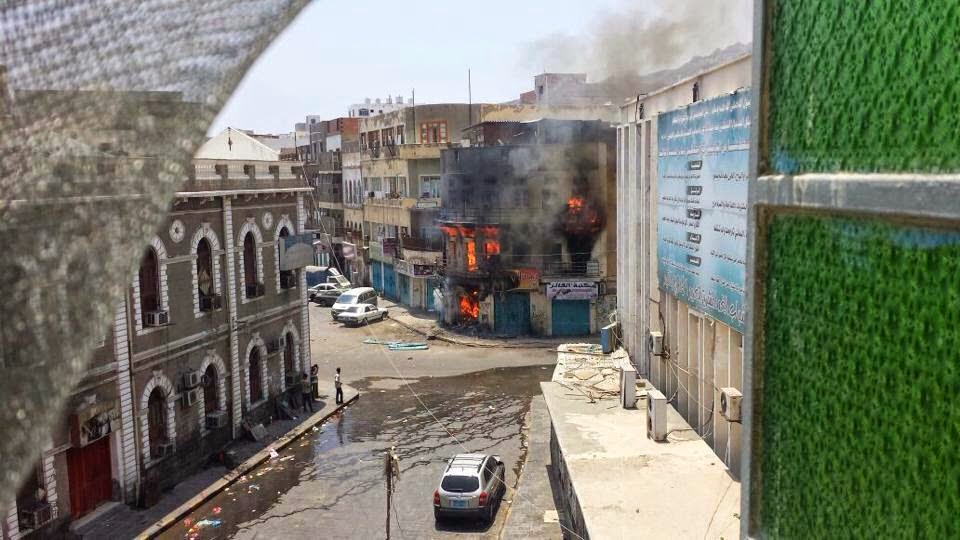 Residential buildings in Kraytor, Aden continues (@HasanSari7)
Residential buildings in Kraytor, Aden continues (@HasanSari7)
By 7:30 a.m., the presidential palace is overrun by the Houthis.
Ahmed al-Shami, a Houthi fighter in Aden, tells MintPress that pro-Hadi militants have been joined by factions within Harak and Islah.
“Al-Islah is trying to turn this fight into a sectarian war,” al-Shami said. “They don’t care how many civilians gets killed in the process, it’s all about money and power for them. We need to free Yemen and let the people decide what they want their future to be.”
Meanwhile, CNN reports that al-Qaida staged a prison break in Mukalla, a major seaport in southeast Yemen:
“Al Qaeda fighters attacked a prison in the coastal Yemeni city of Al Mukallah early Thursday, freeing at least 270 prisoners, a third of whom have al Qaeda links, a senior Defense Ministry official has told CNN. Khaled Batarfi, a senior al Qaeda figure, was among the escapees, officials said.”
Haytham al-Neharee, a local activist, who formerly served as the head of the Socialist Party in Aden, tells MintPress that he had received reports warning that al-Qaida elements had infiltrated pro-Hadi ranks, looking to use the confrontations and chaos as a platform to consolidate power in Yemen.
“Al-Qaida had sleeping cells all over Aden. I was told those cells have been activated and that militants have joined pro-Hadi forces. Don’t be fooled here: this is a tactical move,” al-Neharee explained. “Al-Qaida wants to get a better footing in Aden, and having the city engaged in a bitter civil war is a perfect breeding ground, especially since Riyadh is pushing the sectarian narrative onto people.”
“No one seems to realize how very dangerous those factions are. In Mukalla 300 al-Qaida were freed,” he continued. “Do you know what that means for the south, for Yemen? Never mind the Houthis, we stand to become trap under the boots of al-Qaida. Al-Qaida is the real threat. … And yet the Saudis and this coalition are arming them.”
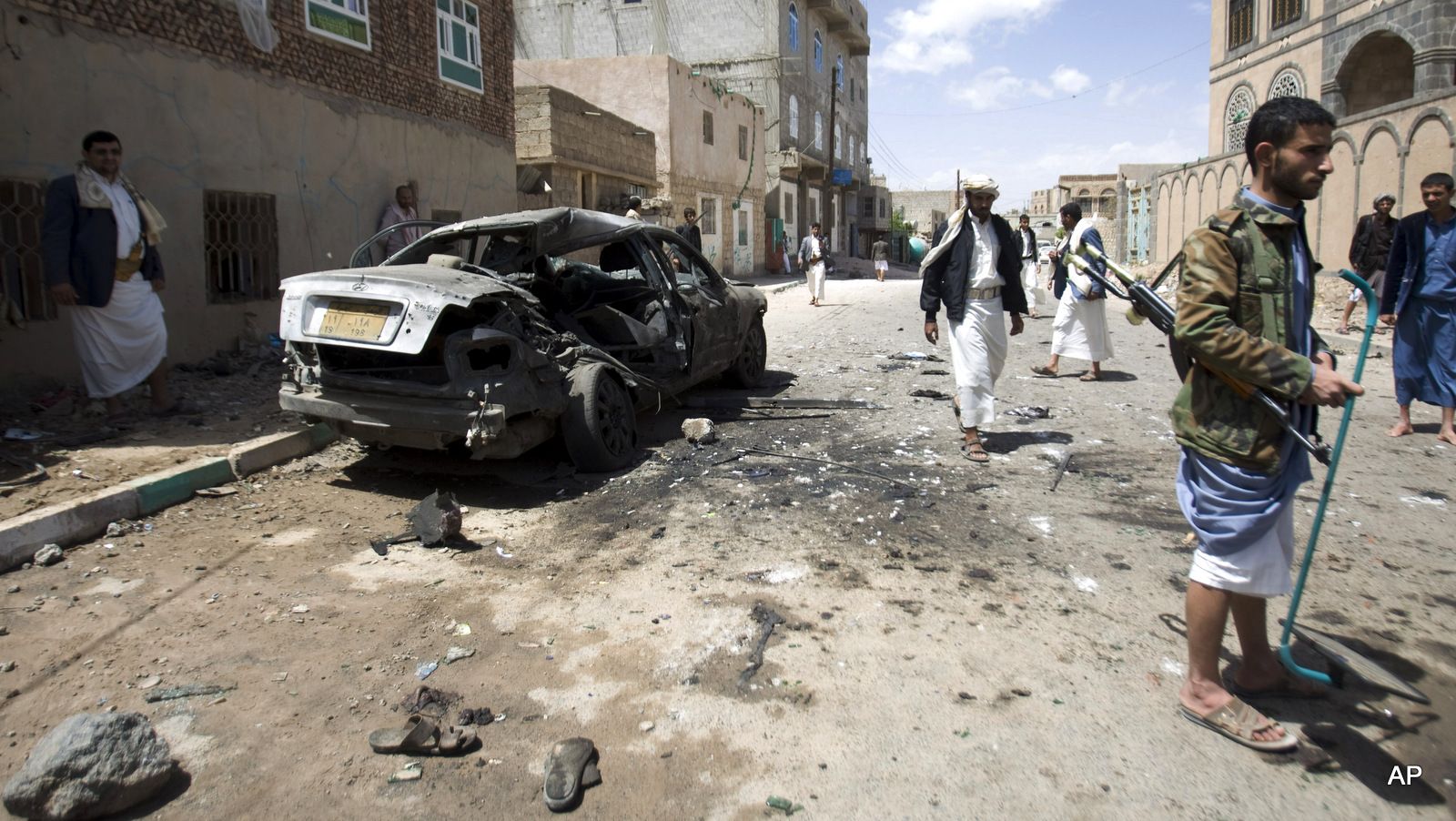 Houthis near a damaged car after a bomb attack in Sanaa, Yemen, Friday, March 20, 2015.
Houthis near a damaged car after a bomb attack in Sanaa, Yemen, Friday, March 20, 2015.
Sara Ahmed Jamal, a Yemeni rights activist and co-founder of SupportYemen, tells MintPress how dire the situation has become on the ground. “Yemenis are quite literally seeing the country go up in flame,” Jamal said. “The situation is terrible. Food is fast running out, water supplies are running low and civilians are desperate for a cease fire.”
The British Red Cross releases a situation report warning of unfolding humanitarian crisis in Yemen. It states:
“More than 10 million people are also in need of food and hundreds of thousands have been forced to flee their homes.
‘The situation is catastrophic and looks set to get worse,’ said the British Red Cross’s Middle East manager Ted Tuthill.
‘The number of people who are in need is staggering and this recent crisis has left food and medicine running dangerously low and houses destroyed or abandoned.’
The British Red Cross is sending £240,000 to towards the immediate relief effort which will fund items such as vital medical supplies and war-wound treatment kits as the number of injuries continues to rise.
The International Committee of the Red Cross (ICRC) is one of the few aid agencies continuing to operate in Yemen and is urging all parties to the conflict to allow aid workers to operate safely following the death of the a Yemen Red Crescent worker this week. It is also calling for the safe passage of supplies into the country.
It currently has more than 300 staff on the ground and is working with the Yemen Red Crescent to provide ambulances, emergency health care, help with evacuations and body retrieval.”
In a report for the Huffington Post, Morgan Meaker writes on Yemen’s unfolding food crisis, stating, “Today, although food is available, prices are unaffordable. As a result, many Yemenis no longer have a nutritious diet.”
She continues, quoting William Picart of the Yemen Peace Project, who says: “there are no jobs available, and many Yemenis who do have jobs — including those employed by the state — aren’t getting paid regularly. So a lot of them just can’t afford the food that’s in the markets.”
“Hospitals are expensive. But 13 million Yemenis have no choice but to drink unsafe water so it’s not unusual for people to need medical attention,” Meaker reports. “Robin Lodge of the World Food Programme (WFP) says: ‘This is having a devastating impact on Yemen’s poor, catching them in a vicious cycle of drinking unsafe water, getting sick and falling into debilitating debt from medical expenses.’ Families are also buying food on credit, further escalating debts.”
In northern Yemen, skirmishes intensify at the Saudi-Yemeni border. The Houthi leadership claim one Saudi military commander is dead.
Saudi border troops kill a family of eight in northern Saada in Razeh district, bringing the death toll to 242, according to Fars News Agency. Local tribesmen call for revenge and retaliation against Saudi Arabia.
April 3, 2015
Borrekha, a district in Aden located near the government-owned oil refinery, which has been seized by the Muslim Brotherhood, remains under the control of Sunni radical groups. Traditionally a stronghold of the Muslim Brotherhood, the district sees a strong influx of armed supporters as pro-Hadi supporters flee Houthi-controlled areas in Aden.
Witnesses on the ground tell MintPress that Saudi-parachuted military equipment has landed in and around Aden. Ahmed al-Dalaimi, an English teacher, says he’s worried that these weapons and ammunition will end up in al-Qaida’s hands.
“Aden is crawling with al-Qaida militants. I have seen them with them headbands,” al-Dalaimi told MintPress. “Everyone knows they’re here, and Hadi is acting as if those guys are on Yemen’s side all of the sudden.”
“I want South Yemen to be independent again, but I never thought I’d see the day when Harakis gang up with Islahis to fight the Houthis. Al Harak has an understanding with the Houthis. We all suffered under the former regime, and now Al Harak is siding with the very people who bombed us and killed us in 1994! Is this for real?”
Speaking to MintPress, Ali Abu Salem, a former coast guard posted in Mukalla, is concerned that al-Qaida will be able to ferry men and weapons from Africa into Yemen now it has an opening onto the sea. “The situation is getting worse every day. Weapons are given to militants without any oversight,” he said. “This is a catastrophe in the making. Al-Qaida is feeding from the chaos.
He continued, “I have no love for Sanaa, but on this one I am with the Houthis. They want what we want, which is the destruction of al-Qaida — everything else we can negotiate. This war is Al Saud’s war not Yemen’s.”
Meanwhile, fierce fighting continues in Crater, a residential area of Aden.
Azeeza Kulaib, a teacher in Crater, tells Mintpress that she had to leave her apartment because she feared it would be shelled. “We are being targeted from every angle. We don’t even know who is shooting at us anymore. We have no electricity anymore and we’re running low on water. We have a generator, but with no fuel there’s just no point,” she said.
“Aden is burning. Everywhere you see destruction, buildings burning. The smell of smoke and death is in the air. I worry about an outbreak of cholera,” Kulaib said. “The dead are left to fester under the burning sun. My husband is a doctor and he said that without proper burial and sanitation Aden is open for a calamity.”
“We worry food supplies will run out, and medicine, too. This is a real problem for us. This war is tearing Yemen apart.”
Mohammed al-Khawlani, a leading member of Ansarallah, the Houthis’ political arm, tells MintPress that all Islah members have been labelled as traitors and will therefore face the full force of the law.
“They are traitors to the nation. They have sided with the enemy, Al Saud, against the people of Yemen,” he said. “We will take all appropriate actions against them.”
There is no official confirmation of reports that medical staff are being shot at indiscriminately in Aden. Pro-Houthis allegedly organize death squads patrol territories under their control to search for members of Islah and other detractors. Several journalists and politicians are reportedly kidnapped.
(MintPress could not independently verify these claims.)
Iona Craig a journalist an award-winning independent journalist who was based in Sanaa until December 2014 reports Houthi militias are targeting journalists.
Second journalist in #Yemen this week to be snatched from their house by Houthis: https://t.co/9EJEXKR7iQ #pressfreedom
— Iona Craigأيونا كريچ (@ionacraig) April 3, 2015
Al-Qaida seizes control of a military base in south Yemen. RT reports: “Suspected Al-Qaeda fighters have seized a major army base in the southeastern city of Mukalla, a military official said. The city is now almost entirely under the jihadists’ control.”
“It is a golden opportunity for Al-Qaeda to take advantage of the anarchy spreading in the whole country now,” Abdel Bari Atwan, the former editor-in-chief of Al Quds, told RT. “I believe that Al-Qaida will be the greatest beneficiary from this kind of anarchy.”
Meanwhile, the United States government confirms that it is not planning to evacuate U.S. citizens from Yemen..
“There are not [any plans],” State Department spokeswoman Marie Harf said on Friday, as reported by Sputnik, when asked if the U.S. has any plans to take a more proactive role in evacuating U.S. citizens who are still on the ground in Yemen.
The State Department spokeswoman stressed that the U.S. has been warning citizens against traveling to Yemen for a decade. “If they do, the United States can provide only limited assistance especially now given that the embassy is closed,” she added.
Harf explained that because the situation in Yemen is “dangerous and unpredictable,” doing something like sending in military assets even for an evacuation could put U.S. citizens’ lives at greater risk.
“We are continuing to evaluate the security situation and we are continuing to look at what the options are, but at this point no change in plans,” she said.
Russia calls for humanitarian intervention in Yemen. Alexey Zaytsev, the spokesman for Russia’s Permanent Mission to the U.N., announces that Russia will convene “an extraordinary meeting of the UN Security Council to discuss the humanitarian situation in Yemen” on Saturday.
“Russia convenes U.N. Security Council consultations to discuss the establishment of a regular and mandatory ‘humanitarian pause’ amid ongoing coalition airstrikes on Yemen,” Zaytsev told RIA Novosti.
April 4, 2015
Yemenis wake up to scenes of utter devastation in Sanaa and several towns and villages nearby.
H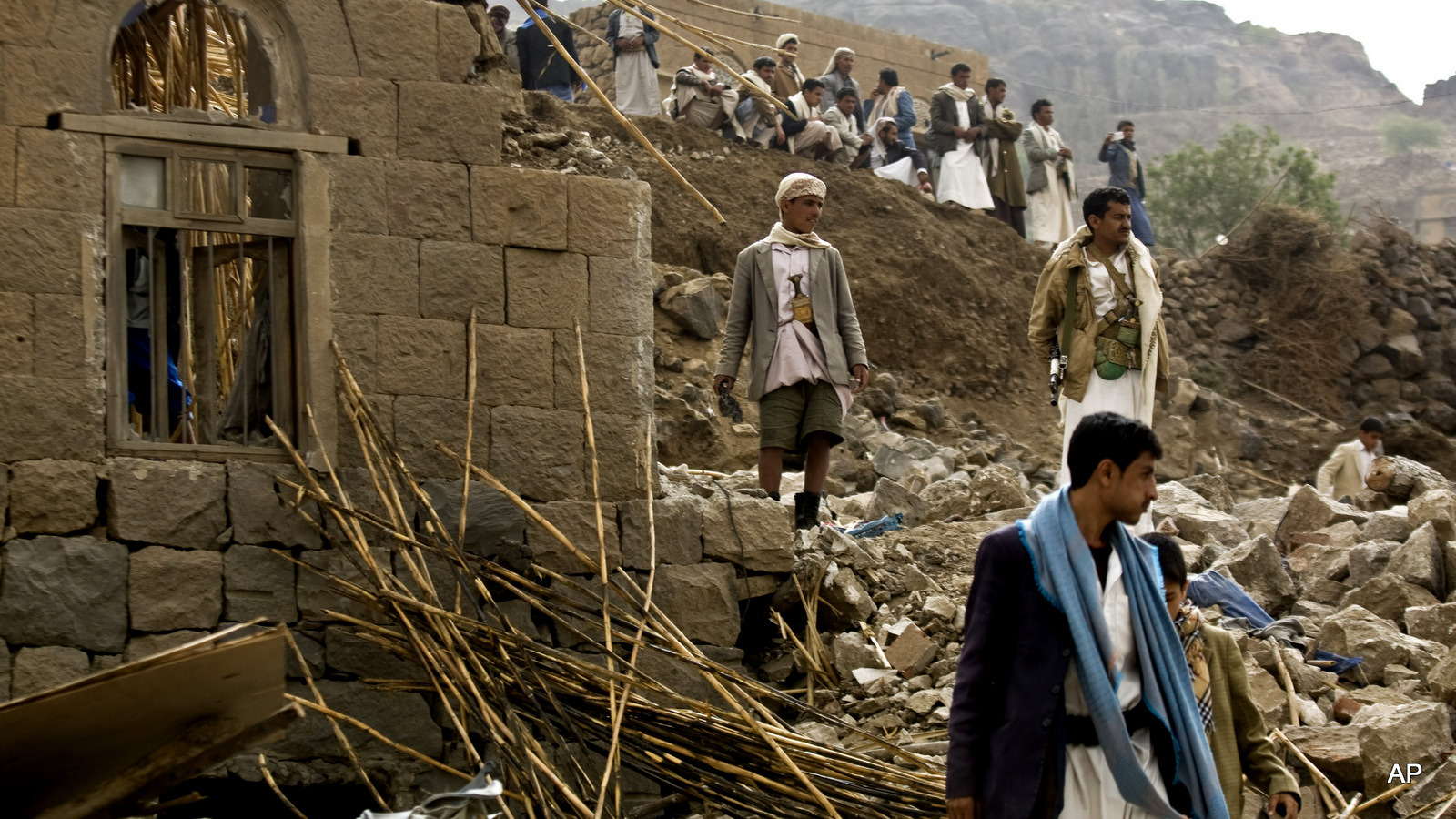 Yemenis stand amid the rubble of houses destroyed by Saudi-led airstrikes in a village near Sanaa, Yemen.
Yemenis stand amid the rubble of houses destroyed by Saudi-led airstrikes in a village near Sanaa, Yemen.
Following Russia’s call for an immediate cease fire in Yemen to allow aid to reach civilians, Yemen’s foreign minister in exile, Riyad Yassin, urges the international community to reject this call, arguing this will only benefit Ansarallah fighters.
Yemenis react badly to report that Yemen FM in exile is rejecting calls for a ceasefire.
Speaking to Sputnik, Yassin calls on Russia to exert pressure on both the Houthis and Saleh, blaming the escalation in violence on them.
“[Russia should] exert pressure on Houthis and Saleh’s supporters to make them ceasefire, violence against civilians, as well as stop attacks on Aden and other cities,” Sputnik quoted the foreign minister as saying.
The International Committee of the Red Cross (ICRC) urges an immediate 24-hour humanitarian pause in Yemen to allow help to be provided to people in the conflict-torn country.
“We urgently need an immediate halt to the fighting, to allow families in the worst affected areas, such as Aden, to venture out to get food and water, or to seek medical care,” the head of the ICRC operations in the Near and Middle East, Robert Mardini, is quoted as saying on the organization’s website.
Mardini insists that ICRC relief supplies and surgical personnel be allowed into Yemen to safely reach the areas that have been most affected by hostilities in the country. “Otherwise, put starkly, many more people will die. For the wounded, their chances of survival depend on action within hours, not days,” Mardini said.
The ICRC says hospitals in Yemen are in need of life-saving medicines and equipment, and people are also suffering from fuel and water shortages and rapidly depleting food supplies.
According to ICRC, more than 48 tons of medicines and surgical kits are ready to be transferred to Yemen on ships and planes. The prepared cargo pending clearance will be enough to treat an estimated 2,000 to 3,000 people.
Meanwhile, Britain continues to support the Saudi-led military operation amid the ongoing escalation in Yemen that it blames on the Houthi insurgency, the U.K.’s deputy permanent representative to the United Nations says ahead of a U.N. Security Council session. “We continue to support the Saudi-led action in Yemen that’s in response to the legitimate request from President Hadi,” Peter Wilson, the deputy ambassador, tells reporters.
As fighting rages in Yemen, especially in Aden and Sanaa, where bombings have intensified in both frequency and severity, the Security Council says it hopes to achieve results on the Gulf Cooperation Council’s planned draft resolution on the situation in Yemen by Monday. “We have arranged for meeting on the side between a few members of the Council and the GCC, we are working on that all day today. We hope that by Monday we can come up with something,” Dina Kawar, April’s Security Council president, tells reporters.
April 5, 2015
Al Hafa Military Compound in south Sanaa is hit by four Coalition airstrikes at 6:30 a.m. local time.
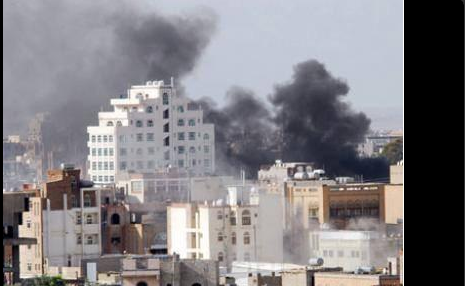
Al Hafa Military Compound in Sanaa – April 5, 2015. (Photo: Nawal Al Khawlani)
Residents in Sanaa confirm that supermarkets are out of flour. Electricity is reportedly available for about two hours per day or less.
“Warplanes from a Saudi-led coalition bombed Yemen’s capital Sanaa overnight, residents said, on the eleventh day of a campaign against Iran-allied Houthi forces opposed to President Abd-Rabbu Mansour Hadi.
The raids came despite calls by Russia and the Red Cross on Saturday for a pause to allow urgent humanitarian aid deliveries and evacuation of civilians.
Residents reported explosions at bases housing army units loyal to the Houthis, while air strikes also hit areas along Yemen’s border with Saudi Arabia.
In the eastern port town of Mukalla, local tribesmen clashed with army troops and killed two soldiers, residents said. Armed tribesmen entered the city on Saturday to combat al Qaeda militants who overran parts of it two days earlier.”
Sarah Ahmed reports on the ground from Aden on the current situation.
Witnesses in the southern city of Taiz confirm to MintPress that a Saudi coalition-led warplane targeted an aid convoy on Sunday.


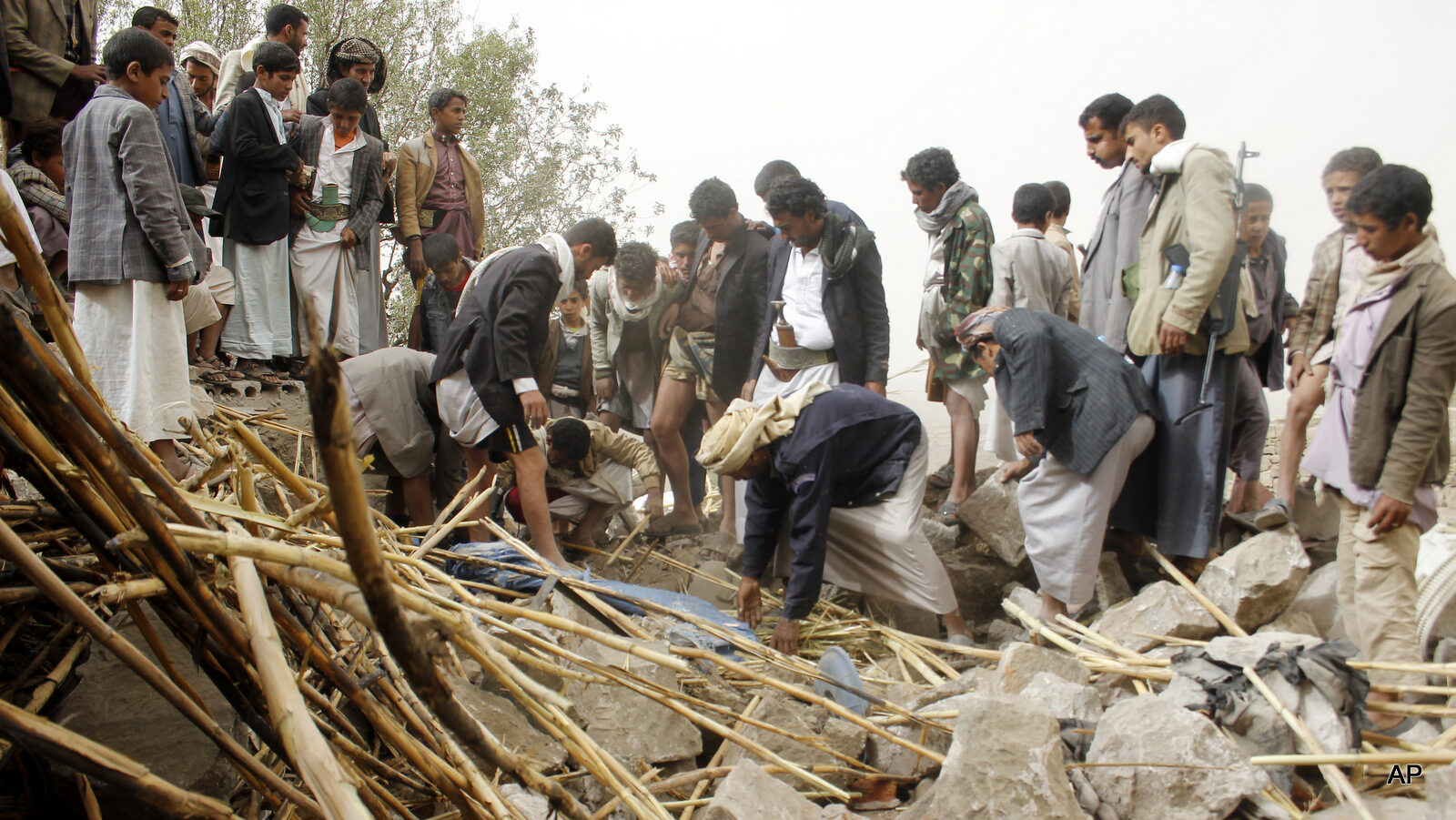
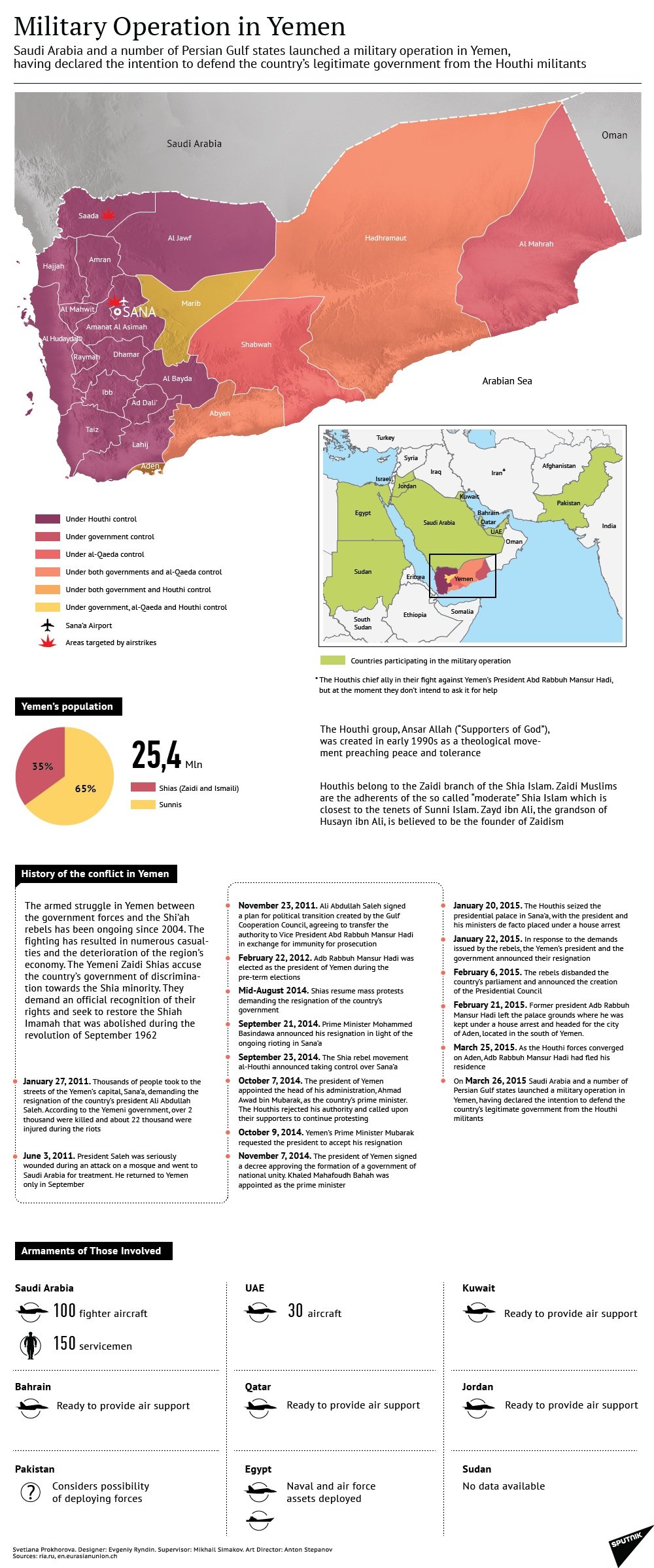
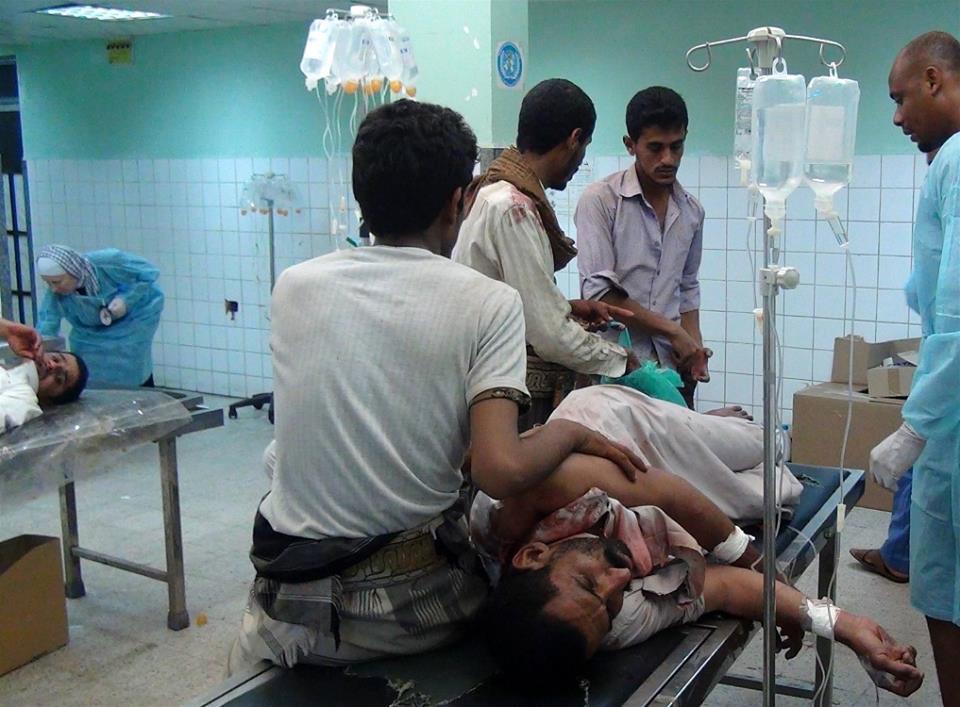
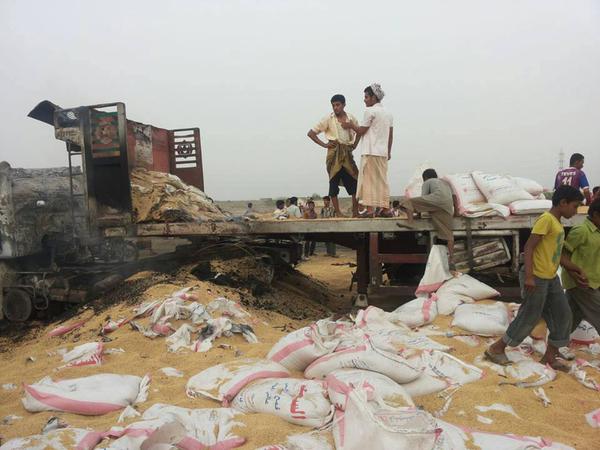 Saudi/US led air strike has targeted wheat trucks killing 4 & injuring 5. This shipment was going to Taiz, Yemen.
Saudi/US led air strike has targeted wheat trucks killing 4 & injuring 5. This shipment was going to Taiz, Yemen.